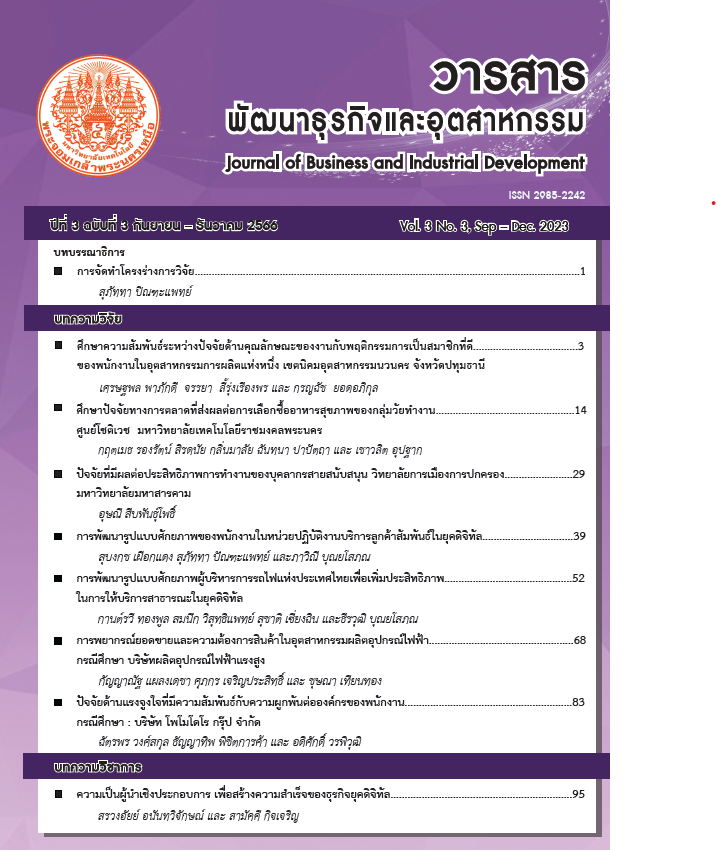ความเป็นผู้นำเชิงผู้ประกอบการ เพื่อสร้างความสำเร็จของธุรกิจยุคดิจิทัล
คำสำคัญ:
ผู้นำ, ภาวะผู้นำ, ผู้ประกอบการ, ธุรกิจ, ยุคดิจิทัลบทคัดย่อ
บทความวิชาการเรื่อง ความเป็นผู้นำเชิงผู้ประกอบการ เพื่อสร้างความสำเร็จของธุรกิจยุคดิจิทัล เป็นการศึกษาเชิงระบบ ในด้านคุณลักษณะและบทบาทของผู้ประกอบการ ในฐานะผู้นำ เพื่ออธิบายปัจจัยที่ส่งผลต่อการเสริมสร้างความเป็นผู้นำเชิงผู้ประกอบการ ลักษณะที่สำคัญของผู้นำเชิงประกอบการ และปัจจัยที่อธิบายประสิทธิผลต่อองค์กร การศึกษา พบว่าปัจจัยที่ส่งผลต่อการเสริมสร้างความเป็นผู้นำเชิงผู้ประกอบการมีองค์ประกอบ 4 ปัจจัย ประกอบด้วย 1) ปัจจัยด้านกลยุทธ์ 2) ปัจจัยด้านการสื่อสาร 3) ปัจจัยด้านบุคลิกภาพ และ 4) ปัจจัยด้านการสร้างแรงบันดาลใจ คุณลักษณะที่สำคัญของผู้นำเชิงประกอบการ ประกอบด้วย 6 ประการ ประกอบด้วย 1) การคิดแบบมีวิสัยทัศน์ 2) การรับความเสี่ยง 3) ความชอบและแรงขับ 4) ความสามารถในการปรับตัว 5) การเสริมอำนาจ และ 6) แนวทางเน้นลูกค้าเป็นศูนย์กลาง ในการให้นิยามด้านประสิทธิภาพขององค์กรของผู้นำประกอบด้วย 3 ด้าน ประกอบด้วย 1) การพัฒนาวัฒนธรรม 2) การรักษาคนเก่ง และ 3) การเป็นองค์กรที่ยืดหยุ่นและคล่องตัว
เอกสารอ้างอิง
Cantillon, R. (2010). Essay on Economic Theory, An. Ludwig von Mises Institute.
Kirzner, I. M. (2015). Competition and entrepreneurship. University of Chicago press.
Pauceanu, A. M., Rabie, N., Moustafa, A., & Jiroveanu, D. C. (2021). Entrepreneurial leadership and sustainable development–a systematic literature review. Sustainability, 13(21), 11695. https://doi.org/10.3390/su132111695
Miller D. (1983). The Correlates of Entrepreneurship in Three Types of Firms. Management Science, 29(7), 770–792. https://doi.org/10.1287/mnsc.29.7.770
Dinh, J. E. , Lord, R. G., & Hoffman, E. (2013). Leadership perception and information processing:influences of symbolic, connectionist, emotion, and embodied architectures. in Day, D.V. (Ed.), The Oxford Handbook of Leadership and Organizations, Oxford University, 29–65.
Currie, G., Humphreys, M., Ucbasaran, D. , & McManus, S. (2008), Entrepreneurial Leadership in The English Public Sector: Paradox or Possibility. Public Administration,4: 987–1008. https://doi.org/10.1111/j.1467-9299.2008.00736.x
Vecchio, R. P. (2003). Entrepreneurship and Leadership: Common Trends and Common Threads. Human Resource Management Review, 13(2): 303–327. https://doi.org/10.1016/S1053-4822(03)00019-6
Prabhu, G. N. (1999). Social Entrepreneurial Leadership. Career Development International, 4(3), 140–145. https://doi.org/10.1108/13620439910262796
Swiercz, P. M., & Lydon, S. R. (2002). Entrepreneurial leadership in high-tech firms: a field study, Leadership and Organization Development Journal, 23(7), 380–389. https://doi.org/10.1108/01437730210445810
Kempster, S. J. , & Cope, J. (2010). Learning to lead in the entrepreneurial context. Journal of Entrepreneurial Behaviour and Research, 16(1): 5-34. https://doi.org/10.1108/13552551011020054
Leitch, C. M., McMullan, C. , & Harrison, R.T. (2013). The Development of Entrepreneurial Leadership: The Role of Human, Social and Institutional Capital. British Journal of Management, 24(3), 347–366. https://doi.org/10.1111/j.1467-8551.2011.00808.x
Li, C., Bao, L., & Jian, Q. (2013). Leadership Styles of Entrepreneurial Women in Eastern China: Characteristics and Differences, Social Behavior and Personality, 41(3), 421–432. https://doi.org/10.2224/sbp.2013.41.3.421
Sawaean, F., & Ali, K. (2020). The Impact of Entrepreneurial Leadership and Learning Orientation on Organizational Performance of SMEs: The mediating role of innovation capacity. Management Science Letters, 10(2), 369–380.
Lin, Q., & Yi, L. (2021). The Multilevel Effectiveness of Entrepreneurial Leadership: A Meta-Analysis. Journal of Management & Organization, 1–19. https://doi.org/10.1017/jmo.2020.45
Olutade, M., Liefooghe, A., & Olakunle, A. O. (2015). Influence of Entrepreneurial Leadership Skills on Employees’ Motivation and Job Satisfaction: A Leader Member Exchange (LMX) approach. Repository. http://repository.futminna.edu.ng:8080/xmlui/handle/123456789/18978
Wright, M., Howorth, C., & Westhead, P. (May 24, 2023). Succession, professionalization and the staying power of familiness': a longitudinal study of management buyouts of family firms. Frontiers of Entrepreneurship Research. papers.ssrn. https://papers.ssrn.com/sol3/papers.cfm?abstract_id=1064341
Surie, G., & Ashley, A. (2008). Integrating Pragmatism and Ethics in Entrepreneurial Leadership for Sustainable Value Creation. Journal of Business Ethics, 81, 235–246. https://doi.org/10.1007/s10551-007-9491-4
Kendall, L. (2017). Ninja Selling: Subtle Skills. Big Results. Greenleaf Book Group.
Rahim, H. L., Zainal Abidin, Z., Mohtar, S., & Ramli, A. (May 24, 2023). The Effect of Entrepreneurial Leadership Towards Organizational Performance. International Academic Research Journal of Business and Technology. Larjournal. https://www.iarjournal.com/wp-content/uploads/IBTC2015-p193-200.pdf
Soomro, B. A., Shah, N., & Mangi, S. (2019). Factors affecting the entrepreneurial leadership in small-and medium-sized enterprises (SMEs) of Pakistan: An empirical evidence. World Journal of Entrepreneurship, Management and Sustainable Development, 15(1), 31–44. https://doi.org/10.1108/WJEMSD-05-2018-0054
Nguyen, P. V., Huynh, H. T. N., Lam, L. N. H., Le, T. B., & Nguyen, N. H. X. (2021). The Impact of Entrepreneurial Leadership on SMEs’ Performance: The Mediating Effects of Organizational Factors. Heliyon, 7(6). https://www.cell.com/heliyon/pdf/S2405-8440(21)01429-8.pdf
Fontana, A., & Musa, S. (2017). The Impact of Entrepreneurial Leadership on Innovation Management and Its Measurement Validation. International Journal of Innovation Science, 9(1), 2–19. https://doi.org/10.1108/WJEMSD-05-2018-0054
Sandybayev, A. (2019). Impact of Effective Entrepreneurial Leadership Style on Organizational Performance: Critical Review. International Journal of Economics and Management, 1(1), 47–55. https://dergipark.org.tr/en/pub/jecoman/issue/49681/636980
Khan, C. B. A., & Ahmed, R. (2019). Organizational Culture and Entrepreneurial Orientation: Mediating Role of Entrepreneurial Leadership. Business & Economic Review, 11(4), 149–178. Retrieved [may 24, 2023] from https://papers.ssrn.com/sol3/papers.cfm?abstract_id=3884737
Hensellek, S., Kleine-Stegemann, L., & Kollmann, T. (2023). Entrepreneurial Leadership, Strategic Flexibility, And Venture Performance: Does Founders' Span Of Control Matter?. Journal of Business Research, 157, 113544. https://doi.org/10.1016/j.jbusres.2022.113544
Khan, R. (2021). A Critical Analysis of Elon Musk’s Leadership in Tesla Motors. Journal of Global Entrepreneurship Research, 11(1), 213-222. https://doi.org/10.1007/s40497-021-00284-z
Archwell, D., & Mason, J. (2021). Evaluating Corporate Leadership in The United States: A Review of Elon Musk Leadership. African Journal of Emerging Issues, 3(2), 1–10.
ดาวน์โหลด
เผยแพร่แล้ว
รูปแบบการอ้างอิง
ฉบับ
ประเภทบทความ
สัญญาอนุญาต

อนุญาตภายใต้เงื่อนไข Creative Commons Attribution-NonCommercial-NoDerivatives 4.0 International License.





